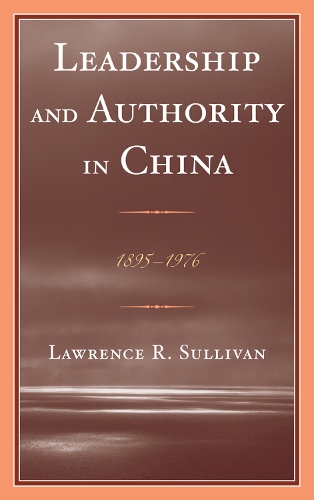
Leadership and Authority in China: 18951978
(Paperback)
Publishing Details
Leadership and Authority in China: 18951978
By (Author) Lawrence Sullivan
Bloomsbury Publishing PLC
Lexington Books
17th July 2014
United States
Classifications
Tertiary Education
Non Fiction
Political leaders and leadership
951.05
Physical Properties
Paperback
334
Width 155mm, Height 229mm, Spine 24mm
513g
Description
This volume presents elite conflicts and political controversies in China from 1895 to 1978 as rooted in two diametrically opposed visions of leadership and political authority: a radical, charismatic model that instills absolute authority in the single leader whose "will" guides the polity and whose "word" is the basis of policy formulation, versus an institutional model in which authority inheres in organization and where collective leadership and decision-making govern the political realm. The former model in modern Chinese history entailed a "leader principle" and personality cult that began with Sun Yatsen and Chiang Kaishek in the Nationalist Party (KMT) and reached its peak with the leadership cult of Chinese Communist Party (CCP) Chairman Mao Zedong, especially during the 1966-1976 Great Proletarian Cultural Revolution. The latter model with its emphasis on collective leadership (jiti lingdao) and "administrative rationalism" began as a reaction among early members of the CCP against the promotion of the Sun and Chiang leadership cults and became a central governing principle in the Communist Party that served as official leadership doctrine beginning with the formation of the Party in 1921. While tensions over leadership issues were relatively muted in the pre-1949 period and early 1950s of CCP history as an apparent "compromise" was reached in which from 1943 onward a cult of the leader was promoted for propaganda purposes but with collegial decision-making governing inner Party decision-making, the mid-to-late 1950s saw this "compromise" among the top leadership come under increasing strain and finally break down. Devoted to a fundamentally different vision of a "socialist" China from other top leaders on a number of economic, social, and political fronts, Mao Zedong pushed his domination of the policy process that ultimately provoked a wholesale assault on the CCP apparatus throughout the country while the leader cult reached mythic proportions during the Cultural Revolution. Confronted by the possibility of civil war and generally opposed to the takeover of the polity by the radical Gang of Four led by his wife Jiang Qing, by the mid-1970s the aging great leader acquiesced to the rebuilding of the CCP along traditional, "institutional" lines.
Reviews
Sullivan (Adelphi Univ.) seeks to examine the interplay between personal leadership and the primacy of organization and collective deliberation within the Chinese Communist Party (CCP), which shaped many of the policy and ideological controversies throughout the party's history. Chapters 1-2 offer an overview of the concepts of authority and despotism and how they were understood in China in the late-18th and early-19th centuries. Chapter 3 looks into political authority in the CCP before the founding of the People's Republic of China (PRC) in 1949. Chapters 4-5 review the intraparty struggle over leadership and authority from the early years of the PRC until the end of the Cultural Revolution in 1976. Chapter 6 brings up the "question of Mao" and asks whether a single leader will once again reign supreme over Chinese society and politics. In conclusion, Sullivan argues that despite a series of institutional and organizational reforms in the post-Mao era, "whether these changes can avoid the dire predictions of a return to the Maoist-style of leadership remains to be seen." Summing Up: Recommended. Undergraduate, graduate, and research collections. * CHOICE *
In an interdisciplinary tour de force combining conceptual analysis, intellectual history, and keen insights into the political culture of dependency, Lawrence Sullivan in this sweeping conspectus traces the evolution of Chinese authority through the course of three tumultuous revolutions: the 1911 revolt against the Qing Dynasty, the Chinese Communist revolution against 'feudal-bourgeois' authority, and Maos chaotic Cultural Revolution. A brilliant discourse on contemporary Chinese politics, suitable for both advanced graduate students and interested lay readers. -- Lowell Dittmer, University of California, Berkeley
Author Bio
Lawrence R. Sullivan is professor of political science at Adelphi University in Garden City, New York and a research associate at the Weatherhead East Asian Institute, Columbia University. He is the author most recently of Historical Dictionary of the Chinese Communist Party (Scarecrow Press, 2011) and Historical Dictionary of the Peoples Republic of China (Scarecrow Press, 2007) and a co-translator and co-editor of Zhou Enlai: The Last Perfect Revolutionary by Gao Wenjian (Public Affairs, 2007).
